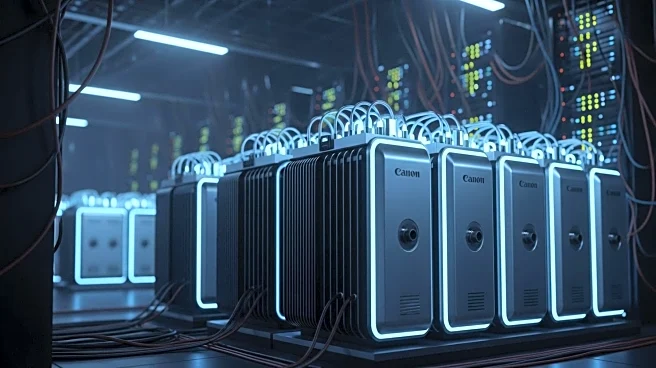What is the story about?
What's Happening?
Bloom Energy has announced a significant partnership with Brookfield Asset Management to provide fuel cells for artificial intelligence data centers. Brookfield plans to invest up to $5 billion in deploying Bloom Energy's technology, marking its first major investment in supporting AI data centers with power and computing infrastructure. Bloom's fuel cells are versatile, capable of operating on natural gas, biogas, or hydrogen, and offer on-site power solutions that do not require a connection to the electric grid. This collaboration aims to design and build 'AI factories' globally, with a site in Europe expected to be unveiled by the end of the year. The announcement led to a more than 20% increase in Bloom Energy's share price.
Why It's Important?
The partnership between Bloom Energy and Brookfield highlights the growing demand for reliable and scalable power solutions in the AI industry. As AI data centers expand, they face challenges with the aging U.S. electric grid, which struggles to provide additional power capacity. This development is crucial as it offers a solution to the grid limitations, potentially preventing increased electricity prices for residential customers. By providing power 'behind-the-meter,' Bloom Energy's fuel cells can help close the grid gap for AI factories, ensuring rapid deployment and scalability. This move could set a precedent for other AI companies seeking alternative power solutions.
What's Next?
The collaboration between Bloom Energy and Brookfield is expected to lead to the construction of multiple 'AI factories' worldwide, with the first site in Europe anticipated by the end of the year. As AI companies continue to expand their data center operations, the demand for off-grid power solutions is likely to increase. Stakeholders, including AI companies and power infrastructure developers, may explore similar partnerships to address the grid challenges and meet the growing energy needs of AI data centers.
Beyond the Headlines
This partnership could have broader implications for the energy sector, particularly in the context of renewable energy adoption. Bloom Energy's fuel cells, which can operate on hydrogen, align with the industry's shift towards cleaner energy sources. The success of this initiative may encourage further investments in fuel cell technology and other renewable energy solutions, potentially accelerating the transition to a more sustainable energy infrastructure.
















